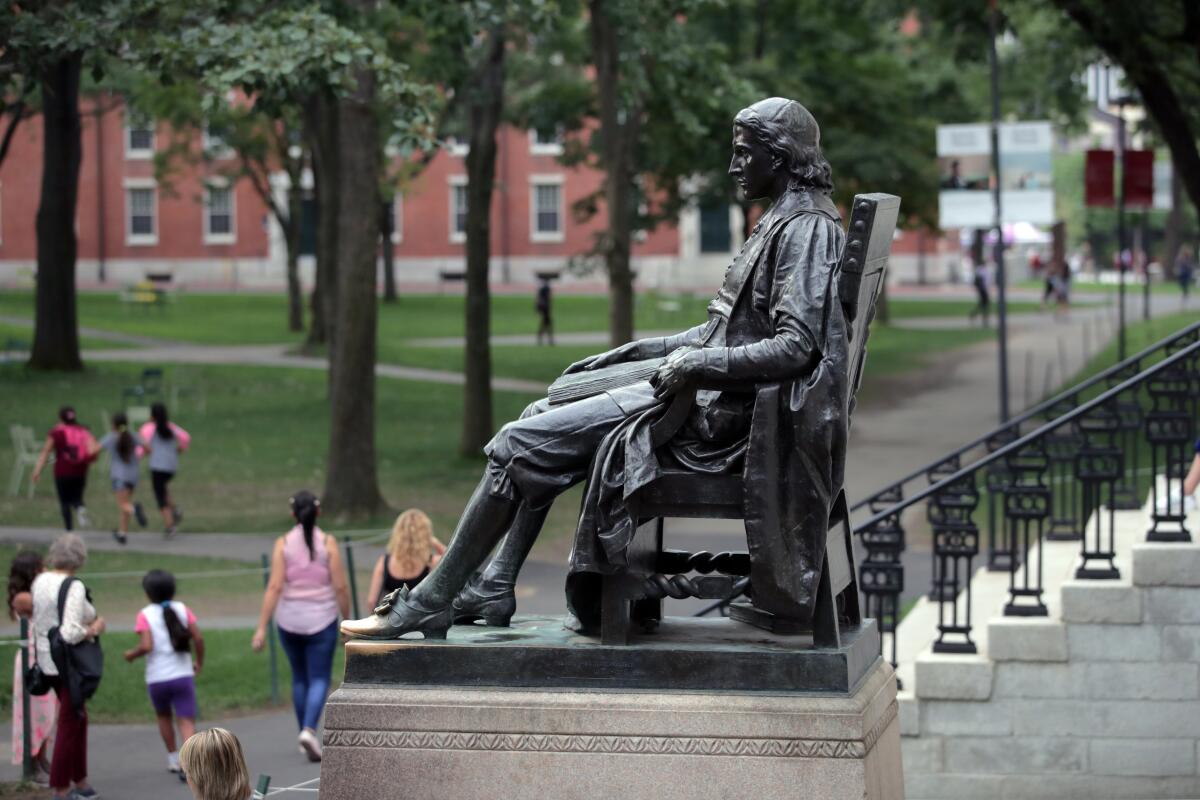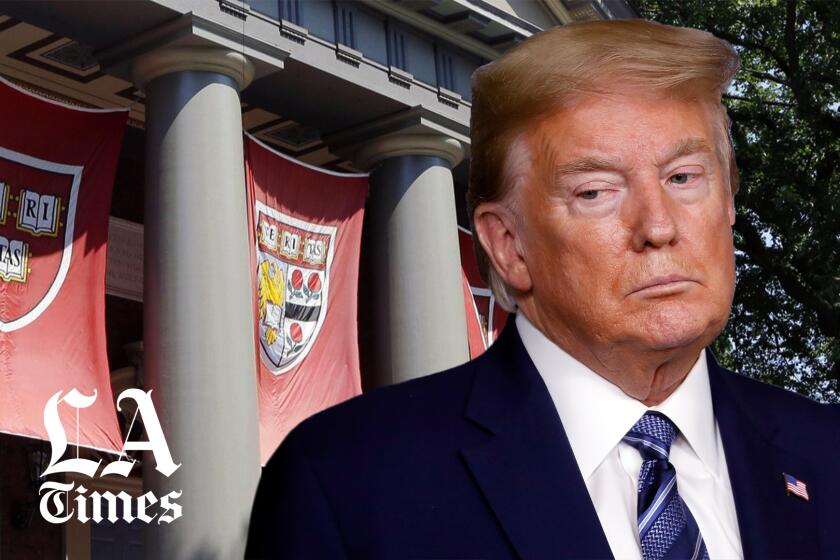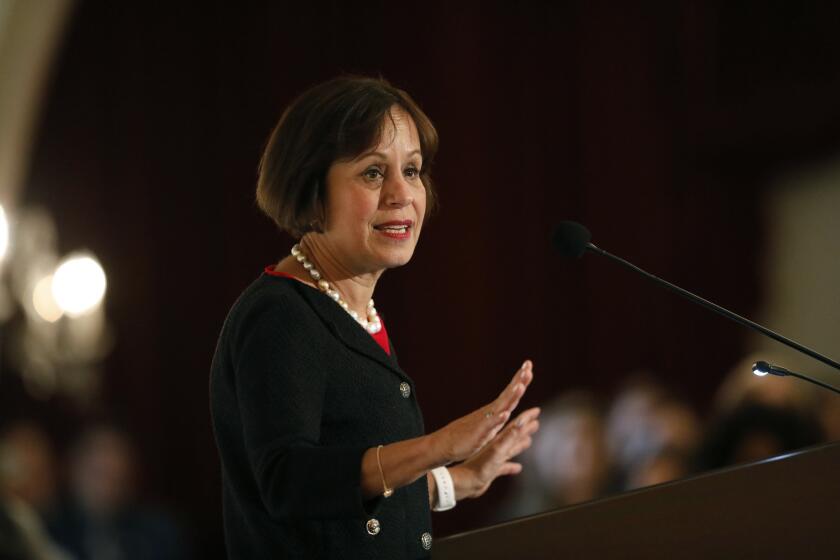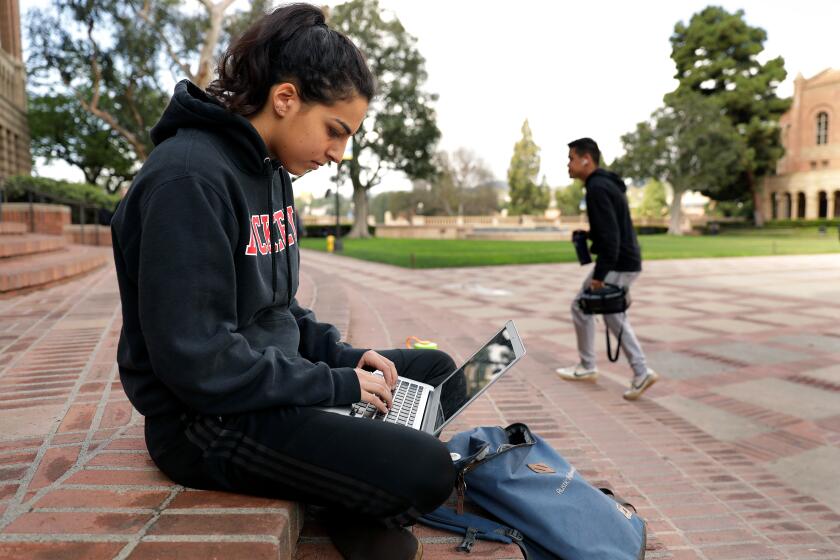Harvard says it will reject coronavirus relief money, but USC is keeping its share

CAMBRIDGE, Mass. — Harvard University said Wednesday that it will turn down $8.7 million in federal coronavirus relief, a day after President Trump excoriated the wealthy Ivy League school over the taxpayer money it stood to receive.
Similar action was taken by Stanford, Princeton and Yale universities, which said that they, too, will reject millions of dollars in federal funding amid growing scrutiny of wealthy colleges.
But USC said it would accept its nearly $20-million allotment. USC said that its $5.7-billion endowment is “substantially smaller than that of our peers” and noted that 1 in 5 of its undergraduates receive federal Pell grants for low-income students.
“We desperately need these emergency funds and will drive 100% of them toward supporting our students who are experiencing financial hardships,” the school said Wednesday.
Officials at Harvard said the elite Ivy League school still faces significant financial challenges because of the pandemic but will refuse the money over concerns that “intense focus by politicians” will undermine the relief program created by Congress.
Harvard says it received funds intended for higher education institutions, not funds for small businesses grappling with the coronavirus crisis.
“While we understand any reallocation of these resources is a matter for the Department of Education, we hope that special consideration will be given to Massachusetts institutions that are struggling to serve their communities and meet the needs of their students through these difficult and challenging times,” Harvard said in a statement.
Trump later thanked Harvard and Stanford at a White House news conference, saying he was pleased that the schools turned down the funding.
“They stopped it,” he said. “They’re not accepting the money and that’s great. So I want to thank Harvard. I want to thank Stanford.”
Congress is offering $14 billion to the nation’s colleges and universities as part of a $2.2-trillion rescue package. Schools were allotted varying sums based on their size and the number of students they teach from poorer backgrounds.
But Trump said Tuesday that Harvard “shouldn’t be taking” its share because it has such deep financial reserves. It echoed concerns from other critics, including some alumni, who said Harvard doesn’t need the money and can rely on its nearly $40-billion endowment.
As the global coronavirus pandemic has forced austerity measures at the University of Southern California, the private college has purchased an $8.6-million Santa Monica home for its president
Education Secretary Betsy DeVos on Wednesday said other rich schools should reject the funding. Affluent schools that do not primarily serve low-income students “do not need or deserve additional taxpayer funds,” she said in a statement.
“Schools with large endowments should not apply for funds so more can be given to students who need support the most. It’s also important for Congress to change the law to make sure no more taxpayer funds go to elite, wealthy institutions,” she said.
Hours later, Sen. Josh Hawley (R-Mo.) said he was introducing legislation to block colleges from receiving coronavirus relief if they have endowments topping $10 billion. Under the proposal, those schools could access federal relief only after they spend a large share of their own money — an amount 10 times the size of their federal allotment — on direct aid for students.
About a dozen U.S. schools have endowments large enough to be affected by the proposal.
The higher education funding was meant to help colleges and students facing financial losses triggered by the pandemic. If colleges accept the funding, they’re required to spend at least half on direct grants for students. Harvard had previously committed to spending its entire share on students, and on Wednesday said it is “fully committed to providing the financial support that it has promised to its students.”
The University of California was hit with $558 million in unanticipated costs in March alone due to the coronavirus, a staggering sum as students canceled housing and dining contracts, medical centers paused elective surgeries and costs to gear up online learning soared.
Stanford, which has an endowment of nearly $28 billion, said it told the Education Department on Monday it would refuse $7.4 million allocated in the package. The school said it wanted to free the funding to be directed to smaller colleges that face an “existential threat” because of the pandemic. Yale expressed a similar sentiment, saying it wants its $6.9 million to go to “colleges and universities in Connecticut whose continued existence is threatened by the current crisis.”
Officials at Princeton said they would reject $2.4 million in aid, but not because of the pressure from DeVos. The school said it made the decision after the Education Department issued new guidelines forbidding the funding from going to students in the federal Deferred Action for Childhood Arrivals program for immigrants who were brought to the country illegally. The school, which has a $26-billion endowment, said the rules were inconsistent with Princeton’s values.
Harvard also said the “evolving guidance” around the funding factored into its decision.
More than 300 colleges were granted larger shares than Harvard, including some that also rank among the nation’s wealthiest. Columbia University, with an endowment of $11 billion, was allotted nearly $13 million.
Major public universities received many of the largest shares, including Arizona State University, which was granted $63.5 million, and the Pennsylvania State University system, with $55 million.
Wealthy colleges are facing new pressure to reject the funding amid a similar outcry over major companies that received emergency aid meant for small businesses. The Shake Shack burger empire said it would return a $10-million loan after facing public anger.
But some of the wealthiest colleges still plan to take the funding. Cornell University, with a $7.3-billion endowment, says it plans to accept $12.8 million in relief and use it entirely on student grants.
More to Read
Sign up for Essential California
The most important California stories and recommendations in your inbox every morning.
You may occasionally receive promotional content from the Los Angeles Times.












